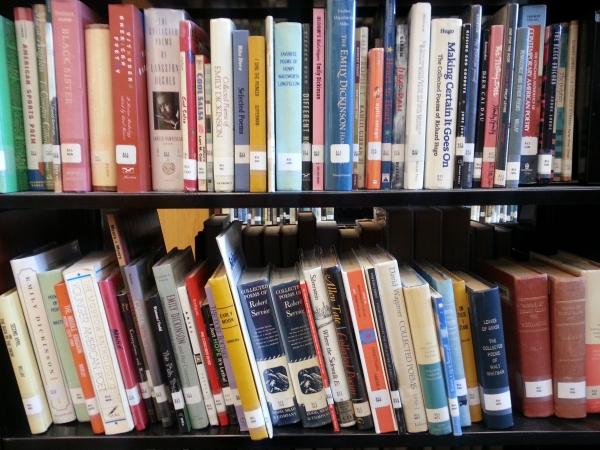Reading poetry allows us to make emotional connections

Poetry books in the school library waiting to be explored.
September 1, 2013
Sylvia. Emily. Anne. Allen. Good friends. More than good friends actually. Friends who I will always go to when my eyes scan the shelves of poetry books. Friends who express words with practically unparalleled elegance.
Because in the library at 811 (the land of poetry), I will melt. This does not happen while scrolling Amazon. Pixelated words in an Amazon preview do not dare compare to printed words from decades ago. Of course there’s the smell—a husky and timber smell, as if I’m venturing into a forest of books.
Some books are complete collections, thick and weighted with the words of a poet centuries ago, others a modern anthology. The anthologies in particular fascinate me, its table of contents reaching out, luring me with strangers and their delightful surprises.
I will never forget sitting cross-legged on the school library floor reading “The Day Lady Died,” because when Frank O’Hara “stopped breathing” at the end, I did too. O’Hara reminiscing about listening to Billie Holliday in a jazz bar, I mesmerized by his woven words—so natural, so liberating. Because even after death, a person can live on: Billie and her soulful voice, O’Hara and his dazzling words.
Inevitably, the central question arises: What is the usefulness in reading poetry? In regards to the standard notion of practicality, in which doing something results in an objective improvement, there is little. Perhaps reading poetry will result in a higher score on some standardized test. Perhaps it will slightly expand one’s vocabulary.
But all of the perhaps are trivial. Because the beauty of poetry does not lie in practicality—it lies in the emotional connections with words. Words that make me clutch the air around me—in desperation, in sorrow, in comfort.
Yet poetry is often shelved in preference for prose. Novels—aren’t they the main focus of many English courses? One chapter after another, so many happenings, so many characters—yet so much left unexplored. But poetry, in its minute captivations, allows every corner of this Earth to have its proper due.
For every sunrise left unappreciated, there is always a chance to swallow the warmth of “Southern Sunrise” by Sylvia Plath. Because a sunrise is not just a sunrise. It is the morning stillness collapsing into the light of day. And when reading those precious words—I feel infinite.
